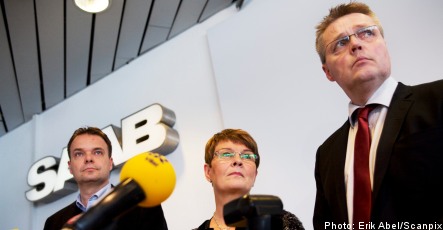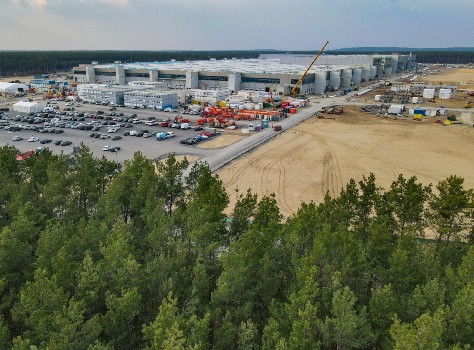“I not thinking of letting GM get away from this so easily,” Olofsson said a midday press conference in Trollhättan, home to Saab’s main Swedish operations.
The remarks came following a morning spent discussing Saab’s precarious situation with company leaders and workers.
“We’ve had a very positive conversation with Saab’s leadership, but also with a number of works on the factory floor,” said Olofsson at a midday press conference in Trollhättan.
She also stressed the importance of Saab’s workers for the company’s future.
“Employees are Saab’s primary resource,” said Olofsson.
“It’s good that the employees have so much faith in Saab.”
One of Olofsson’s deputies at the Ministry of Enterprise and Energy, state secretary Jöran Hägglund, also criticized GM for abandoning Saab over the years.
“Our criticism is directed at GM in this case and not at Saab. GM hasn’t taken responsibility as an owner for many years,” he said.
Olofsson also stated that the government needed a private investor to answer for Saab’s turnaround and repeated the state should not own car makers.
“We need to know there is a secure ownership which takes responsibility for the business plan so that it (Saab) can show a profit in 2012, 2013,” Olofsson said.
At the weekend Swedish media quoted Saab’s CEO as saying rival carmakers were among potential investors in the company, which was granted protection from its creditors on Friday by a Swedish court.
Olofsson said since GM has declared it would cut its ties to Saab in a year, a new owner was a prerequisite for the government to believe the Swedish car brand had a future.
“Let us hope those who have contacted (Saab) are the kind of interested parties who are prepared to step in,” she said.
The government has welcomed a reorganization of Saab, but has said it believes its turnaround plan — in which it projects profitability in 2011 — is too optimistic. Saab estimates it made a loss of 3 billion kronor ($543 million) last year and expects a similar result this year.
GM has said it will fund some of Saab’s liquidity needs but that it will not keep the company beyond January next year.
Sweden’s government also said it was preparing to apply for 4 billion kronor from the European Globalization adjustment Fund to support Sweden’s south-western region, which is home to much of the country’s auto industry.
Union leaders who met with Olofsson during her visit also emerged with a more positive perspective on the government’s stance.
“Their message to us is clearer. It really feels like they want to stand up and help,” said labour representative Paul Åkerlund to the TT news agency.
He also seemed to appreciate the difficulties facing the Swedish government with respect to an eventual buyer for Saab.
It may be more of a tactic for negotiating with GM,” he said.



 Please whitelist us to continue reading.
Please whitelist us to continue reading.